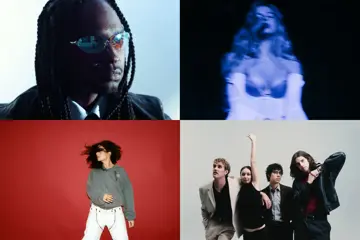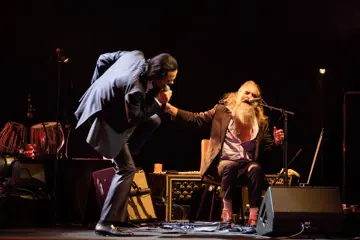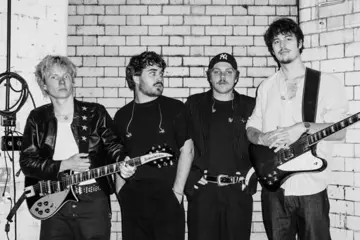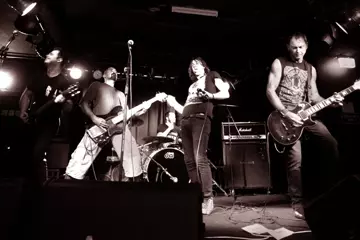On its second Friday, you could tell that the Toronto International Film Festival was winding down, when the T-dot downtown found the festival's credentialed industry vastly outnumbered on the streets by Bluejays baseball fans.
TIFF begins with a bang on its first weekend, wholly taking over the city centre of Toronto. But by the second weekend, the press and special-guests have all gone home, the streets no longer swallowed whole by movie-biz peeps, more chewed-over.
If TIFF ends with a whimper, that's fine by me. For all the charm the movie-mania theme-village vibe (a café right in the central hub, for example, has waitresses dressed in Wes Anderson-themed t-shirts, bright yellow Darjeeling duelling with powder blue Zissou), endless days of watching endless films can have even the heartiest of foreign correspondents —like yr old pal Film C— feeling over it.
The reason that you do keep soldiering on, though, scheduling films all day from 8.30am to midnight, is the glorious sense of possibility; the notion that, amidst so many films, hope springs eternal. You may lose touch with reality, faith in humanity, and the time necessary to eat actual proper meals, but you don't lose your faith in cinema.
Day Five
And, on a day like today, you're rewarded for that faith. Admittedly, there was more sitting through season-anticipating Oscarbait: Freeheld comes from a script by Ron 'the dude who wrote Philadelphia' Nyswaner, and it's another based-on-a-true-story, inspirational issue-movie. Julianne Moore plays a New Jersey cop who, when confronted with terminal cancer, wants her police pension transferred to her legal domestic partner, Ellen Page. The county says no, and, lo, soon we have a courtroom-drama-come-cancer-weepie, with marriage equality on the docket, Steve Carell chewing the scenery as a camp gay-rights activist, and emotional button-pushing running wild.
And, I do declare, there were also films that didn't quite work: Julie Delpy's latest directorial effort, Lolo, a straight-up French farce in which Vincent Lacoste plays the vindictive mummy's-boy who's pissed when Delpy dates bumpkin Dany Boon. And The Other Side, where Roberto Minervini continues sketching out his corner of backwoods Deep South docudrama, but the sweetness and near-Malickism of the excellent Stop The Pounding Heart is lost in a portrait of repellent rednecks. If you've ever wanted to hear Barack Obama called "nigga" repeatedly, this is the film for you.
But, then, o!, there were Wednesday's glories. Bang Gang (A Modern Love Story) is an instant teens-gone-wild classic; Eva Husson's debut picture portraying a crew of French high-schoolers who stage regular orgies, videoing the proceedings and uploading it online. It's part social club, part social-media performance, and their casual, baggage-free approach to fucking is both admirable and horrifying. Eventually, things get dark, feelings get hurt, and STDs run rife, but Husson reserves moral judgment, and never uses her smart, lyrical, ensemble screenplay (based, loosely on a true story) to admonish Kids These Days. Instead, she finds the ache and the poetry amidst all the lithe flesh and lives in flux.
Chevalier is Athina Rachel Tsangari's follow-up to her great, strange Attenberg, and it's another glorious Greek Weird Wave wig-out; one good enough to rival Yorgos Lanthimos's genius English-language-debut The Lobster, which is also screening here. Chevalier finds a group of men on a boat staging an Alpha Male contest, that involves them literally measuring penises, baldness, and cholesterol levels. Co-written with Lanthimos's screenwriter Efthimis Filippou, it's an absurd, incisive satire of masculine virility and vanity, a mockery of arcane fraternities and their ridiculous, homoerotic rituals.
And Evolution may be the best thing showing at TIFF. Lucile Hadzihalilovic's long, long, long-awaited follow-up to her 2004 triumph Innocence, it's another surreal, dreamlike, impressionist-minimalist fairy-tale, in which a group of children are groomed for suspicious, sinister purposes in an enclave wholly detached from recognisable reality. Here, it's a rocky island populated entirely by young boys in matching shorts, and single mothers in tight ponytails. When these boys come of age, they're sent to a shadowy hospital, where shackles, sinister surgery, and body-horror imagery await. Evolution is a weird, wild work of wondrous, gruesome art; Hadzihalilovic summoning the spirits of Eraserhead and early Cronenberg without ever resorting to homage or genre tropes. It's a singular cinematic nightmare, best comparable only to its predecessor; Hadzihalilovic a unique auteur who needs to be allowed to make films more often than once-a-decade.
Day Six
At some point —between the dawning of Obamacare and the legalisation of marriage equality— Michael Moore has turned into a "crazy optimist". And, in turn, Where To Invade Next is a crazily optimistic film from documentary cinema's great populist. Instead of seething with rage at the state of his nation, Moore's latest lark is full of abundant positivity. Here, its central gimmick is that Moore will 'invade' European nations and 'steal' what he wants from them. But instead of oil or political gain, he wants to steal social policy: the free university education of Slovenia, the 8 weeks annual paid vacation from Italy, the gourmet school lunches and sex-positive sex-ed from France, the decriminalised drug-possession of Portugal, the world-leading education ideals (no homework, less hours at school, more play) of Finland, the prosecution of fraudulent bankers from Iceland. As Moore patriotically points out, many of these ideas were American-born; his hope is that they can be imported back home.
Truth taps back into those dark times when the world needed to turn to Moore as contrary media voice: the peak of W. Bush America; where to dare to be against the raft of invasions was tantamount to treason ("are you or have you ever been a liberal?" Cate Blanchett mocks, mid-'lefty' witch-hunt, herein). It's a based-on-a-true-story tale of the blowback against a 60 Minutes special that uncovered young George's military history, which borders on desertion. It, initially, plays like an on-the-case/pursuit-of-truth movie, where Blanchett's Brockovichian producer and a rag-tag crew of crack investigators (Topher Grace, Elisabeth Moss, Dennis Quaid) seek out various needles in haystacks via their bloodhound noses. But, slowly, it turns into a damning depiction of the state of journalism in a time of media conglomerates and their political alliances.
The Fear is a portrait of war not from a political distance, but on the ground. Nino Rocher is a French romantic who —though beautiful enough that male modelling should be his fate— enlists for WWI service out of curiosity, to see what was war is like. It's, as ever, hell: bombs, noise, mud, blood, slaughter, corpses piling in trenches filled with dirty water. Damien Odoul, finally measuring up to the promise of his grim debut, 2001's Deep Breath, shoots battles as wholly subjective: dark and disorienting, with Colin Stetson's eerie avant-gardist horn-blowing providing a score that adds to the feeling.
Michael Madsen's great cine-philosophy piece, 2010’s Into Eternity, took the premise of a Finnish nuclear storage facility, the Onkalo, to thoughtful ends: imagining what could happen to Earth over the 40,000 years it takes for its waste to break down. In comparison, Return Of The Atom, Miika Taniila and Jussi Eerola's documentary on Finland's newfound obsession with planning the construction of nuclear power-plants, seems droll at best, dry at worst; coldly, detachedly looking on at the local politics, multinational construction-conglomerate clusterfucks, underpaid steel-workers, and eco protestors milling around the decade-long building project on Olkiluoto.
Blood Of My Blood is the latest film for Marco Bellocchio, the old master ever obsessed with Italian Catholicism and its attendant bonkers superstition. The pic’s a diptych, divided in twain; two vaguely-related stories set centuries apart, sharing the same actors more than the same themes. In fact, Bellocchio seeks to make his two halves stark in their juxtaposition: the first a grim 17th-century religious drama of ill-fated passion, the second a wacky comedy of modern village politics set in contemporary Italy.
And if 'Sally Draper makes a pact with Satan at a remote boarding school' sounds like the elevator pitch of your dreams, does Osgood Perkins have a movie for you! February stages a long, suggestive preamble in which eeriness abounds: Kiernan Shipka and Lucy Boynton left behind on a snowy weekend after term is out; Emma Roberts a hitch-hiker returning to the school, getting a ride with a suspicious older couple; dark shadows looming on the walls; doors forever squeaking. Perkins shuffles the chronology to create confusion, unease, and some mystery, but there's little real thrills or scares, even after Lord Kramdar instructs Shipka to pull out that big knife, wield some Psycho homage, and "kill the cunts".
Day Seven
Out of all the mooted Oscar-contenders I'd seen across TIFF's first week, none of them qualified as actual great cinema; films like The Danish Girl and Brooklyn and Freeheld defined more by their sense of prestige-picture safety than any real thrill or ambition. But, then, on the seventh day, came Room. Hail to thee, o Room! Lenny Abrahamson's follow-up to What Richard Did fabulously adapts Emma Donoghue's so-named novel, taking its stylised train-of-thought monologues and fashioning a profound cinematic world from them. Brie Larson and son Jacob Tremblay live locked-up lives imprisoned in a single shed, presided over by a Fritzlesque captor; the child's conception of the entire world limited to these few square feet. Abrahamson makes this tight space feel like a whole realm unto itself; then manages to pull off the difficult transition to the world outside, which comes after the first act. The film is full of emotional gravity, real humanity, and earnt profundity; it making no cheap choices, pushing no easy buttons. And its lead turn, from 8-year-old Tremblay, is captivating and amazing, an all-time-great child actor performance deserving of all the praise it'll receive.
The Family Fang is a picture of comic familial dysfunction with an interesting conceptual-art wrinkle, and a sense of mystery that arises mid-way through. Director Jason Bateman and Nicole Kidman star as the grown-up kids of performance-artists Christopher Walken and Maryann Plunkett. After a childhood spent engaging in situationist hijinks, they're hardly the most grounded of adults. "You have kids, you're going to damage them," Walken reasons. "That's what parents do". When Walken and Plunkett disappear mid-film, the police think they've been abducted, by their kids know it's another performance; leading them into digging through old ghosts and past hurts, feeling out the definitions of family, doing some growing, etc. It's an indie film of familiar emotional beats, black humour, and minor pleasures.
Equals wants you to believe that it’s set in some distant-future dystopia, where after a 'great war' 99.6% of the world has been left uninhabitable. Save, of course, for the sci-fi-film's familiar enclave of utopian idealism, modernist architecture, hive-mind behaviour, computers that talk in a neutral voice, and matching white uniforms for every citizen. These matching uniforms involve men wearing suits with no socks, though, which means that Equals, for all eternity, will look not like a film of the distant-future, but one of 2015. Its totalitarian-society premise is that emotions have been outlawed, medicated, and bred-out of human-beings. But then Nicholas Hault gets a boner for Kristen Stewart, and all bets are off; how can emotions (and, y'know, boning) be wrong when it feels so right?
High-Rise plays with the notion of the dated dystopia, preserving JG Ballard's near-future parable in the year it was published, 1975. With its flared trousers, crocheted bags, shag carpet, wood panelling, patterned marble, sideburns, moustaches, chauvinist masculinity, and all-analogue devices, Ben Wheatley (Kill List, A Field In England) has a blast recreating the signifiers of distant fashions and technologies once considered cutting-edge. And, he turns ABBA's S.O.S. into a musical motif, it appearing played by string quartet and, in a climactic montage, by Portishead (the closing credits roll The Fall's Industrial Estate, after an audio recording of Margaret Thatcher proselytisin' the wonders of free-market capitalism; a sweet piece of unexpected political one-two on close). The literal symbolism of the source-text (upper floors of the titular building for the upper class, lower floors for the lower class) is simple, but Wheatley turns the tale's things-fall-apart descent into a wild orgy of depravity and grotesque decadence. Marshalling a game cast —headlined by Tom Hiddleston, Luke Evans, Elisabeth Moss, Sienna Miller, and Jeremy Irons— and showing his familiar directorial panache (a through-a-kaleidoscope freakout!), Wheatley goes all-out for High-Rise, his big crossover film happy to be wildly over-the-top.
Taking its queues from both First Person Shooters and Parkour Go-Pro videos posted on YouTube, Hardcore bills itself as the first all-POV action-movie. Those who suffer from cinematic motion-sickness by duly warned: the entire film plays out through the perspective of a cyborg, who spends the film's 90 swift, silly minutes falling, crashing, tumbling, and whipping his head this way and that. It's way too disorienting, visually, to look like a video game; but when our cyborg hero starts cocking guns and blowing away endless ranks of identical henchman, the video-game influence is all too apparent. Hardcore is a mix of technical achievement, self-aware silliness (Sharlto Copley, as an ever-regenerating variety of caricature avatars, is in on the joke), and adolescent-male awesomeness; its trips to the strip club, manifold explosions, and gruesome deaths the stuff teen dreams're made of.
Days Eight and Nine
With TIFF starting to wind down, I actually took an overnight trip to Montréal, a city in the middle of its annual Pop Montreal festivities. I see two shows in one night: Ought play their twitchy, super-tight, barked-out post-punk in a sweaty old Ukrainian community hall, after an opening set from Tasseomancy which shows the Austra-affiliated twins moving away from folkiness, towards Kate Bush-esque pop. And then there's the glories of a Braids/Empress Of double-bill; each delivering the jams from their respective album-of-the-year contenders with dynamic delivery and oh so much heart; the crowd dancing, wild, to Braids' feminist anthem-of-forever Miniskirt as it hits 3AM.
When not riding the train to-and-fro Québec, I've time to see some smaller art-movies playing in the TIFF wind-down. As I Open My Eyes is a coming-of-age portrait of a headstrong young singer dealing with the police-state of modern Tunisia. The Clan is an audacious, Scorsese-esque portrayal of a real-life Argentine family who casually committed endless politically/financially-motivated kidnappings during the dirty wars. And Right Now, Wrong Then is yet another Hong Sang-soo joint, the prolific/obsessive director showing all his regular predilections as a middle-age director (in shell parka, blue jeans, and sneakers!) wandering through tourist spots meets a a young, attractive woman, they get embarrassingly drunk together, and, then, the filmmaker replays the action all over again with slight variations on the theme.
Zoom is a Canadian-Brazilian co-production that's largely live-action, partly-animation, and determinedly wacky; Alison Pill starring as a graphic-novelist and sex-doll artist(!) obsessed with breasts, the film essentially about the commodification of sex in entertainment. At first, it seems not-so-funny and like it's trying too hard, but Matt Hansen's script, in its final act, reveals a delicious conceit where the stories-within-the-story are all authoring each other —comic depicting movie depicting novelist depicting comic— in an ever-evolving circle, making you wish it'd gone that meta earlier on.
Zoom may or may not quite work, as whole, but it does feature two things that were on-screen plenty during TIFF: Gael García Bernal (who was also in Desierto and the great Eva Doesn't Sleep) and penises. From the animated cocks of Zoom and Anamolisa to the fleshy wangs of Bang Gang, Youth, and Chevalier, there was plentiful tackle-out in TIFF; this most epic of festivals, if nothing else, moving towards the hoped-for future of Kevin Bacon's nudity-equality dreams.















